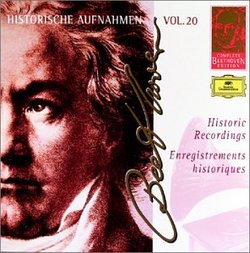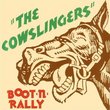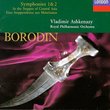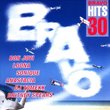| All Artists: Beethoven Title: Complete Beethoven Edition, Vol. 20: Historical Recordings Members Wishing: 1 Total Copies: 0 Label: Deutsche Grammophon Release Date: 12/9/1997 Genres: Pop, Classical Styles: Vocal Pop, Opera & Classical Vocal, Chamber Music, Forms & Genres, Concertos, Theatrical, Incidental & Program Music, Historical Periods, Classical (c.1770-1830), Modern, 20th, & 21st Century, Instruments, Keyboard, Strings, Symphonies Number of Discs: 6 SwapaCD Credits: 6 UPC: 028945380421 |
Search - Beethoven :: Complete Beethoven Edition, Vol. 20: Historical Recordings
 | Beethoven Complete Beethoven Edition, Vol. 20: Historical Recordings Genres: Pop, Classical
|
Larger Image |
CD DetailsSimilar CDs
|
CD ReviewsA Prime Set For Beethoven Collectors Jeffrey Lipscomb | Sacramento, CA United States | 06/29/2004 (4 out of 5 stars) "To my mind, this Volume 20 is by far the most interesting part of DG's complete Beethoven series. The transfers are excellent -in virtually every recording that has a CD competitor, the DG is markedly superior. Here is a brief summary of what is found in this 6-disc set.CD 1. This 1941 Schuricht/BPO "Eroica" is a relatively straight and unaffected account, perhaps a bit lower key than his later studio reading with the Paris Conservatory (EMI) and his various live performances from the 50's and 60's. The 1913 acoustic 5th - the first recording - is with the famed Arthur Nikisch and the BPO. Needless to say, the sound is pretty bad (although this is by far the best transfer of it that I have heard). It's quite similar to Furtwangler's 1926 version (Koch Legacy).CD 2. Annie Fischer's account of the 3rd Concerto (1957, with Fricsay) is one of the gems of this set: it's long been my favorite reading. By contrast, Fricsay's 7th (1960/BPO) has always struck me as rather heavy and pedantic. It's surely no competition for such readings as Furtwangler's, Weingartner's, or Konwitschny's. I wish DG had chosen instead the rare Rudolph Schulz-Dornburg/Berlin Radio c.1940 - a magnificent performance that ranks with the very best ever.CD 3. The "live" Leonore Overture #2 here with Fritz Busch and the Danish State Radio (1950) gets off to a rather slow start, but in the final pages it really comes to life. Busch's "live" 1950 9th is one of the great "classical" readings, just behind the Weingartner and Schuricht accounts. My "romantic" favorites are 3 by Furtwangler (1942, 1951, 1954) and the 1950 Abendroth.CD 4. One of the lesser discs here. The short-lived Josef Wolfsthal is accompanied (1929) by Manfred Gurlitt and the BPO in the Violin Concerto. Despite many beautiful moments, it simply is not in the same league as Joseph Szigeti (1932 with Bruno Walter) or the great 1941 "live" Adolf Busch/Fritz Busch NY Phil. (the latter is BADLY in need of a good CD transfer). The live Kempff Emperor Concerto from 1936 (with Peter Raabe/BPO) is the pianist's earliest recorded account: it is neither as fluent nor as well-accompanied as his 1953 reading with Paul van Kempen/BPO (from their complete concerto set on DG).CD 5. Furtwangler's live 1943 Coriolan Overture here is THE performance of the work - no one else comes close to the fiery commitment on display here. The Egmont Overture (same forces in a 1933 studio recording) is my all-time favorite: it is only challenged by a rare LP with Fritz Busch and the LA Phil. I am not much of a Klemperer fan - this Leonore III (Berlin State Opera 1927) has had far more interesting readings by the likes of Furtwangler, Abendroth and Georgescu. Kempff's "Rage Over a Lost Penny" (1937) ranks with Schnabel and Ginsburg as one of the three finest-ever accounts. What is Richter, with Wislocki and the Warsaw Phil (1959), doing here in the Mozart Piano Concerto #20? The answer: Richter uses the cadenza written by Beethoven. It's a lovely reading, but I still prefer Yvonne Lefebure/Furtwangler (Ermitage) and various versions by Clara Haskil.CD 6. These performances of the "Spring" and "Kreutzer" Sonatas by Schneiderhan (1952) and Kulenkampff (1935), respectively (both with Kempff), strike me as rather dutiful and uninspired. There are far more engaging readings of the "Spring" by Busch & Serkin, Szigeti/Schnabel, Goldberg/Kraus, and Taschner/Farnadi. For me, the great "Kreutzers" are those by Huberman/Friedman, Goldberg/Kraus, Busch/Serkin, Taschner/Gieseking, Szigeti/Bartok, and Martzy/Antonietti. The lieder offerings by Heinrich Schlusnus are superb - but I wish DG could have squeezed in the Gerhard Husch "An die ferne Geliebte" too!This fine DG set's highlights are the Nikisch 5th, the Fischer 3rd Concerto, the Busch 9th, Furtwangler's Coriolan & Egmont, and the songs with Schlusnus. Don't let this one pass you by!" A curiously uneven box set, but the best things are memorab Santa Fe Listener | Santa Fe, NM USA | 03/12/2007 (3 out of 5 stars) "The reviewer below, who belongs to the small dedicated contingent of historical collectors here at Amazon, offers a run-down of this 6-CD set that's frequently at odds with what I hear. Since the DG complete Beethoven series was a major enterprise, I thought it worthwhile to give a different take on this hodge-podge of historical reissues.
CD 1. A wartime (i.e., Nazi) recording may still be distrasteful to some listeners. In any event this 1941 Schuricht/BPO "Eroica" is in reasonably good sound, cleaned up within an inch of its life, which took out too many high frequencies. Dullish sound suits a dullis reading, however. Why DG chose to spotlight this performance is a mystery. The rest of the disc is a miss as well, since Nikisch's 1913 Fifth Sym. is a mere curiosity, unlistenable by any standard except the archivist's. CD 2. Annie Fischer is miked close and loud in the Third Piano Concerto, which otherwise has clear mono sound from 1957. Her warm-hearted interpretation is straightforward except for some niggling pauses and accents that sound odd. Fricsay offers nothing special in the accompaniment, either, but he comes to life in a Seventh Sym., with the BPO in stereo from 1960 that's nicely alert, although the Scherzo and finale feel somewhat too relaxed. I'm not sure I'd even call this a historical performance, but in any case its quality is high, if not outstanding. Many Sevenths earlier and later have more distinciton. CD 3. Fritz Busch has such a small discography that the same things keep circulating; that's true of this concert reading of the Leonore Over. #2 with the provincial-sounding Danish Radio Sym. Orch., which comes in good, clear mono from 1950. It's a wonderfully musical, satisfying reading. From the same period and of equal quality comes a live Ninth Sym. that's conventional and yet full of Busch's commitment and integrity. If only the Danish musicians were equal to his inspiration. They lack power and virtuosity; as for the vocal soloists, all Danish as well, they hold their own without showing any great ability. Calling this performance great, as Mr. Lipscomb does, baffles me. CD 4. Constant hiss and cramped, boxy acoustics from 1929 mark a drastic drop in recorded quality. I'm a fiarly qualified historical listener, but I've never heard of the soloist, Josef Wolsthal, or the conductor, Manfred Gurlitt. That's my loss, because both perform splendidly in an alert, fairly quick reading that finds the violin miked close enough to sound sweet and natural. Still, one would think that DG has greater examples in their vast vaults, in considerably better sound. I'll take Mr. Lipscomb's word for it that the 1936 "Emperor" is Wilhelm Kempff's earliest recording, but the notes say it's from the studio, not live. In any event, the sound, though hissy, is full enough to enjoy. I'm unfamiliar with Peter Rabe, who leads the Berlin Phil. here, but he's adequate. Kempff is fine although not inspired. By this point one has serious doubts about why these particular recordings have been chosen. CD 5. Suddenly we burst upon greatness with Furtwangler's live 1943 Coriolan Over. in a searing reading that must be the greatest this work has ever had. The Nazis pioneered tape recording, and the sonics here are surprisingly good. They lapse back into murky mono for Furtwangler's Egmont Over., a studio version from 1933 that's worth hearing for its rock-ribbed nobility. Drop down another few notches in sound to Otto Klemperer's Leonore Over. #3 from 1927--one laments that this mesmerizing performance isn't more listenable. After a very fine "Rage Over a Lost Penny" from Kempff (1937) we get the Mozart piano concerto #20 in d minor, the excuse being that both cadenzas are by Beethoven. Sviataslav Richter is the pianist, and his conductor one Stanislav Wislocki with the scrappy Warsaw Phil. (stereo, 1959). Richter's committed Communism kept him from taking his pick of great Western orchestras during this time. Needless to say, his performance is veyr fine, but again I don't hear white-hot inspiration or much individuality for that matter. CD 6. Now we leave orchestral music behind for the "Spring" and "Kreutzer" Sonatas by Schneiderhan (1952) and Kulenkampff (1935), respectively (both with Kempff). I've never joined the Schneiderhan cult, and his "Spring" sonata sounds merely straightforward. Kulenkampff, known to me only from a few recordings with Furtwangler, has more to say in the Kreutzer, which is in just as good sound form the Thirites as the preceding one. This is an outstanding Kreutzer by any standards, vying with the best for style and expressivity. The collection ends with the song cycle "An die ferne Geliebte" and four other songs from the famed baritone Heinrich Schusnus. Being from 1939, the sound is relatively natural and clear; in fact his voice is captured quite well. Most listeners will already know if they admire the Lieder style of the period, with its extremely free rhythms--free to the point of barely existing, in fact. Schusnus's singing is certainly old-fashined but not antique, and he is intensely involved in each song. Both accompanists are long forgotten and do only a serviceable job. How to sum up? I was surprised to find only two performances I would call great--Furtwangler's Coriolan and Kulenkampff's Kreutzer sonata--while most of the rest falls within the range of middling enjoyable. DG could have done much better. In the end I'm happy I bought this set for $30 in a used record shop." |

 Track Listings (8) - Disc #1
Track Listings (8) - Disc #1


